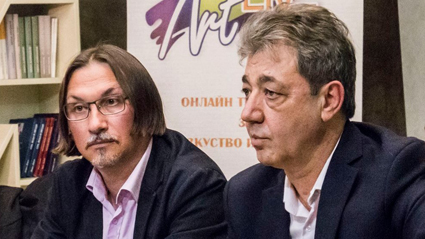The premiere of a new book entitled “Former People according to State Security Classification” brought together hundreds of people who still crave for justice because of the unpunished crimes of communism. The book’s first print run has been sold out for just a week.
"Former people" was a label put on industrialists, clerics, military, politicians, and intellectuals - all persons who contributed to the development of Bulgaria before the coup on September 9th 1944. The communists borrowed the terminology after the nationalization in 1947 from the Stalinist NKVD in order to label people who lost their social and public status after the change of power. On more than 500 pages in his book "Former People," professors Villi Lilkov and Hristo Hristov reveal the scale and ways of repressions imposed on the most capable, the most educated and most virtuous Bulgarians. And although they were successfully isolated from society, the totalitarian power never managed to crush their spirit.
 “The repressions against the so called ‘former people’ continued until November 10, 1989 and included displacements, camps, various administrative and judicial punishments, but the so called justice of the Bulgarian Communist Party was political and not objective,” Hristo Hristov says. “And, of course, the repressions were also transferred to the sons and daughters of these people with the mandatory surveillance. They were oppressed whether they were trying to find a job or trying to enter universities, as many were forbidden to continue their education. Indeed, the invisible repression of State Security did not stop at all during the nearly half-century-long totalitarian regime. And since the party always needed enemies, it turned the so-called ‘former people’, who are holders of the values of the Bulgarian National Revival as its main ideological opponents.”
“The repressions against the so called ‘former people’ continued until November 10, 1989 and included displacements, camps, various administrative and judicial punishments, but the so called justice of the Bulgarian Communist Party was political and not objective,” Hristo Hristov says. “And, of course, the repressions were also transferred to the sons and daughters of these people with the mandatory surveillance. They were oppressed whether they were trying to find a job or trying to enter universities, as many were forbidden to continue their education. Indeed, the invisible repression of State Security did not stop at all during the nearly half-century-long totalitarian regime. And since the party always needed enemies, it turned the so-called ‘former people’, who are holders of the values of the Bulgarian National Revival as its main ideological opponents.”
Bulgaria is the only eastern European country where officials of the former State Stater Security and senior communist party members have become key figures of the transition period and have take control of key positions in business, banking, the judiciary, media, and politics. Even today, State Security agents occupy ministerial posts, sit in parliament, give advice the president… So, it is logical to ask whether there are "former people" today - people for whom some doors are still closed, people marginalized and humiliated, not needed by the new system?
“Sadly, that's true,” Hristo Hristov says. “Not only the so-called ‘former people’ and their families, but all the victims of communism were quickly pushed to the periphery of society. And we are all responsible for having no memory of the totalitarian past, for this ‘organized process of oblivion’, as Professor Evelina Kelbecheva calls it. “In the last few years since Russia occupied Crimea, we see how easily the mistakes of the near history can be repeated,” Christo Hristov says. “It is therefore important for the young generation to know the truth about the totalitarian period, especially when myths are cleverly propagated. Myths such as how good it was back then using brainwashing methods through the Internet and the media. And if society and young people do not know what the price of freedom is, then it can be easily lost.” "Former People" is a book that is good to be present in every Bulgarian home. In order to end once and for all fictitious stories of some elderly people about the “comfort” and “peaceful life” during the times of socialism. Young people must find out about the atrocities committed by the criminal communist regime and keep the mission of protecting freedom in their hearts."
“Freedom is never more than one generation away from extinction,” Ronald Reagan once said.
English: Alexander Markov
The year 2024 was marked by political instability and confrontation - not so much over ideas for solving Bulgaria's long-standing governance puzzle, but rather over personal egos and individual agendas. This turbulent year shaped the political landscape,..
The clock on the facade of the State Puppet Theatre in Stara Zagora has long been a symbol of the city. It was set in motion in 1977 and is unique on the Balkan Peninsula. The theatre recently shared details about the clock on its Facebook page after..
"Every day, we should think about peace and the messages that politicians send,” journalist Tsvetana Paskaleva, who has been living in Armenia for 30 years, says. "The situation around us and in neighbouring countries is unstable and..
Romania becomes the largest natural gas producer in the EU Romania was the largest natural gas producer in the EU in 2024..
For the 21st consecutive year, Simitli is hosting one of the largest masquerade festivals in Bulgaria. Originally a local entertainment, "Simitli - The..
The connection between Bulgaria, "Dali's Moustache" and Picasso is a topic that could remain widely discussed in the next few years, and perhaps even..

+359 2 9336 661
